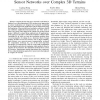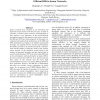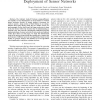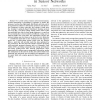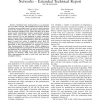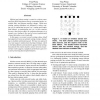139
click to vote
LCN
2006
IEEE
15 years 8 months ago
2006
IEEE
— Despite the fact that sensor networks could often be deployed over three-dimensional (3D) terrains, most approaches on sensor localizations are designed and evaluated consideri...
101
click to vote
LCN
2006
IEEE
15 years 8 months ago
2006
IEEE
As sensor networks become denser and more widely deployed, the potential develops for interconnecting these networks to combine datasets, share technological solutions, and to con...
123
Voted
LCN
2006
IEEE
15 years 8 months ago
2006
IEEE
There is increasing research interest in solving routing problems in sensor networks subject to constraints such as data correlation, link reliability and energy conservation. Sin...
ITNG
2006
IEEE
15 years 8 months ago
2006
IEEE
Sensor networks have emerged as an interesting and important research area in the last few years. In order to construct a wireless sensor network, synchronization of base stations...
104
Voted
INFOCOM
2006
IEEE
15 years 8 months ago
2006
IEEE
— The inherent trade-off between energy-efficiency and rapidity of event dissemination is characteristic for wireless sensor networks. Scarcity of energy renders it necessary fo...
INFOCOM
2006
IEEE
15 years 8 months ago
2006
IEEE
Abstract— Flooding based strategies are conventionally employed to perform querying and broadcasting in sensor networks. These schemes have low hop-delays of Θ( 1 M(n) ) to reac...
121
click to vote
INFOCOM
2006
IEEE
15 years 8 months ago
2006
IEEE
— For a wide variety of sensor network environments, location information is unavailable or expensive to obtain. We propose a location-free, lightweight, distributed, and data-ce...
116
Voted
INFOCOM
2006
IEEE
15 years 8 months ago
2006
IEEE
— Distributed time synchronization is an important part of a sensor network where sensing and actuation must be coordinated across multiple nodes. Several time synchronization pr...
146
click to vote
IEEECIT
2006
IEEE
15 years 8 months ago
2006
IEEE
Efficient and robust routing is central to wireless sensor networks (WSN) that feature energy-constrained nodes, unreliable links, and frequent topology change. While most existi...
128
click to vote
IDEAS
2006
IEEE
15 years 8 months ago
2006
IEEE
In this paper, we present SURCH, a novel decentralized algorithm for efficient processing of queries generated in sensor networks. Unlike existing techniques, SURCH is fully dist...
